八年级英语上册Unit1课件.ppt
合集下载
人教版八年级上册英语unit1词汇语法ppt课件
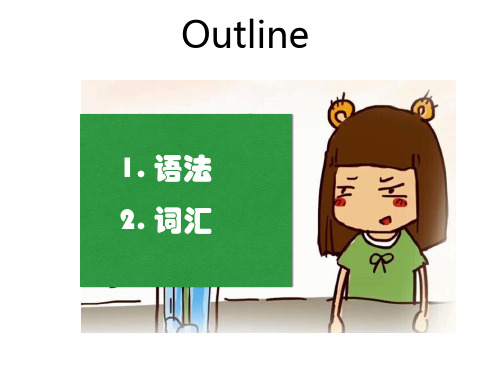
I felt like crying when I heard the truth.
feel like +句子 感受到
I felt like I was an angel do sth.
I decide to adopt a dog.
n. decision 决定
时态标志词:
last系列: last week/night yesterday系列: yesterday evening ago系列: three days ago in系列: in+过去时间点 其他系列: just now
肯定句 主+was/were+ 其他
He was my boyfriend.
right: + 5 wrong: 对方组+9
1.—Why was he late,Tom?
— He was late ____ he was ill, not ____ the bad weather.
A. because; because of
B. because of; because
C. because; because
D. because of; because of
2. 老鼠和老虎的区别是什么? __W__h_a_t_’_s_t_h_e__d_i_f_f_e_r_e_n_c_e__b_e_t_w_e_e__n_a__m_o__u_s_e_a_n_d__a__t_ig_e_r_?________
right: +4 wrong: 分数除2
—How do you like the 2018 FIFA World Cup Russia?
—It’s very ____. I love it.
A. boring
feel like +句子 感受到
I felt like I was an angel do sth.
I decide to adopt a dog.
n. decision 决定
时态标志词:
last系列: last week/night yesterday系列: yesterday evening ago系列: three days ago in系列: in+过去时间点 其他系列: just now
肯定句 主+was/were+ 其他
He was my boyfriend.
right: + 5 wrong: 对方组+9
1.—Why was he late,Tom?
— He was late ____ he was ill, not ____ the bad weather.
A. because; because of
B. because of; because
C. because; because
D. because of; because of
2. 老鼠和老虎的区别是什么? __W__h_a_t_’_s_t_h_e__d_i_f_f_e_r_e_n_c_e__b_e_t_w_e_e__n_a__m_o__u_s_e_a_n_d__a__t_ig_e_r_?________
right: +4 wrong: 分数除2
—How do you like the 2018 FIFA World Cup Russia?
—It’s very ____. I love it.
A. boring
八年级英语上册Unit_1_课件
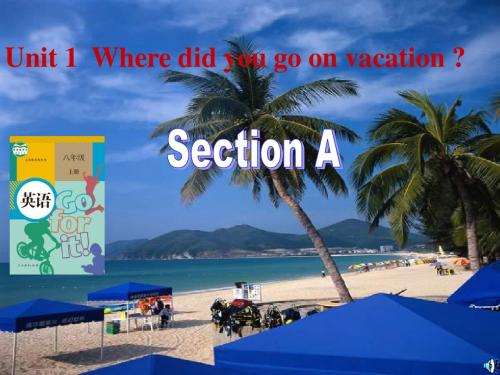
Unit 1 Where did you go on vacation ?
写出下列动词的过去式
1. look
2. live
3. stop 4. go
5. hope
6. trip 7. call 8. eat 9. want 10. are
looked lived stopped went hoped tripped called ate wanted were
Where did Brad go on vacation? He visited his uncle.
went to summer camp Where did they go on vacation?
They went to summer camp.
黄山
went to the mountains
went to a park
Where did they go on vacation? They went to a park.
went shopping
Where did Lily go on vacation? She went shopping.
(如果你能 用过去式 说出短语, 拜访我 参观博 就能得到 叔叔2 物馆3 相应分数, 去夏令 去海滩3 快快加油 营3 去爬山 呦!)
行为动词(即实义动词)的过去式 没有人称和数的变化。(was,were 除外) I went to school yesterday. They went to school yesterday.
行为动词一般过去时的否定式
一般过去时的否定式是在动词原形 前加助动词did not (didn’t).
prefer — preferred
写出下列动词的过去式
1. look
2. live
3. stop 4. go
5. hope
6. trip 7. call 8. eat 9. want 10. are
looked lived stopped went hoped tripped called ate wanted were
Where did Brad go on vacation? He visited his uncle.
went to summer camp Where did they go on vacation?
They went to summer camp.
黄山
went to the mountains
went to a park
Where did they go on vacation? They went to a park.
went shopping
Where did Lily go on vacation? She went shopping.
(如果你能 用过去式 说出短语, 拜访我 参观博 就能得到 叔叔2 物馆3 相应分数, 去夏令 去海滩3 快快加油 营3 去爬山 呦!)
行为动词(即实义动词)的过去式 没有人称和数的变化。(was,were 除外) I went to school yesterday. They went to school yesterday.
行为动词一般过去时的否定式
一般过去时的否定式是在动词原形 前加助动词did not (didn’t).
prefer — preferred
人教版八年级英语上册《 Unit 1 Where did you go on vacation Period 1 Section A(1a-2d)》PPT课件

museum
stayed at home
Where did she go on vacation ?
She stayed at home.
went to New York City
Where did he go on vacation?
He went to New York City.
Uncle
family. Rick: Wow! Did you see Huangguoshu
Waterfall? Helen: Yes, I did. It was wonderful. We 相当多 took quite a few photos there. 一些特殊的W事hat about you? Did you do
vacation.
2c Group work:Role play conversations between Nancy.
Kevin, Julie. You can talk about the activities in the chart and other activities.
A: Nancy, Where did you go on vacation? B: I went to New York City. A: Oh, really? Did you go with anyone? B: Yes, I did.
Unit 1 Where did you go on vacation ?
Revision
How was your weekend ? It was great / OK /
not bad / not very good …
What did you do last weekend ?
八年级英语上册《Unit 1 How often do you exercise:Section A》课件
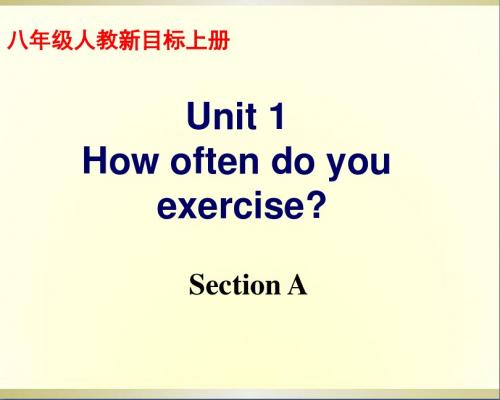
the results of the English contest
英语比赛的结果
2) as a result 由于, 因此。如: As a result, Tsinghua becomes the first-class university. 因此,清华成为一流的大学。 3) at Green High School 在格林高中 在学校用介词at。如: at Junior School 在初中 at Primary School 在小学
2. 不定代词 all “全部”, most“大部分”, some“一些”, no“没有一个” 这些词可以在句中作主语、宾语、 表语或定语。如: All the waiters in the restaurant are very busy.
All the students in our school have to wear school uniforms. I know most people in this party.
watching TV 4. ___________ shopping 5. ___________
1b. Listen and fill in the blanks with the words. always(100%)—usually—often— sometimes—hardly ever—never(0%)
95% 0% 5%
85%
2%
13%
All students= 100% Most students= 51%-99% Some students=1%-50% No students=0% Here are the results of the student activity at
UNIT1-what-is-the-matter复习PPT优秀课件

八年级英语 上册
Unit 1 What’s the matter?
arm leg
head neck back hand
knee foot
eyes mouth
hair face ear
throat
pairwork
A: what’s the matter? B: I have a sore throat.
A:What’s the matter?
B:I have a __s_o_re__th_r_o_a_t___. A:You should __d_ri_n_k_s_o_m__e_h_o_t_t_ea__w_i_th__h_o_n_e_y_,
or__g_o_t_o_s_e_e__th_e_d_o_c_t_o_r____. You shouldn't_e_a_t_d_r_y_f_o_o_d_s_u_c_h_a_s__c_o_o_k_ie_s______
or __s_p_e_ak__t_o_o_l_o_u_d_ly________.
A:What’s the matter? B:I have a _s_t_o_m_a_c_h_a_c_h_e__. A:You should__l_ie__d_o_w_n_a_n_d__h_a_v_e_a_r_e_s_t____.
You shouldn't __ea_t_s_w__e_et_t_h_i_n_g_s___________.
.
What’s the matter?
I have a_s_o_r_e__b_a_c_k.
You should ___s_e_e_a__d_o_c_to_r. You shouldn't__e_x_e_r_c_is_e___.
Unit 1 What’s the matter?
arm leg
head neck back hand
knee foot
eyes mouth
hair face ear
throat
pairwork
A: what’s the matter? B: I have a sore throat.
A:What’s the matter?
B:I have a __s_o_re__th_r_o_a_t___. A:You should __d_ri_n_k_s_o_m__e_h_o_t_t_ea__w_i_th__h_o_n_e_y_,
or__g_o_t_o_s_e_e__th_e_d_o_c_t_o_r____. You shouldn't_e_a_t_d_r_y_f_o_o_d_s_u_c_h_a_s__c_o_o_k_ie_s______
or __s_p_e_ak__t_o_o_l_o_u_d_ly________.
A:What’s the matter? B:I have a _s_t_o_m_a_c_h_a_c_h_e__. A:You should__l_ie__d_o_w_n_a_n_d__h_a_v_e_a_r_e_s_t____.
You shouldn't __ea_t_s_w__e_et_t_h_i_n_g_s___________.
.
What’s the matter?
I have a_s_o_r_e__b_a_c_k.
You should ___s_e_e_a__d_o_c_to_r. You shouldn't__e_x_e_r_c_is_e___.
八年级英语上册Unit1课件
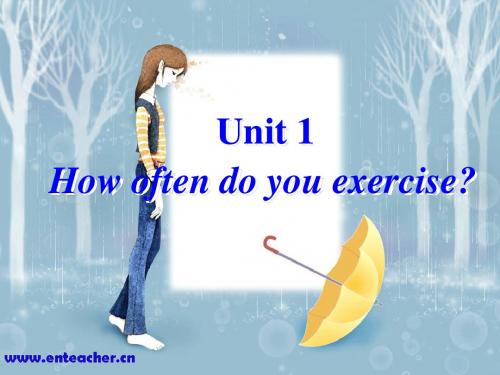
Girl 2 : I often go skateboarding. Boy 2 : And I sometimes watch TV. Reporter: How about you? Girl 3: I hardly ever watch TV. I love reading. Reporter: Oh, why is that? Girl 3: Oh, I don't know. I guess I just like books.
Fill in the blanks with the information in the “Activity Survey” and “Vocabulary Key”.
Green high school: Activity Survey Activity Everyday Once or Three or twice a four times week a week Exercise 15% 10% 75% Do 95% 0% 5% homework Watch TV 85% 2% 13%
He is often late for school. 他上学经常迟到。
(4)sometimes的频度为20%左右, 意为“有时”,表示动作偶尔发生。 可以位于句首,以示强调。例如:
It is sometimes hot and sometimes cold. 天气忽冷忽热。 Sometimes he does it this way and sometimes he does it that way. 他有时这样做,有时那样做。
Reporter:How often do you exercise? Cheng :Oh,I exercise about three times a week. Reporter:How often do you shop? Cheng :Shop? I shop about ... about twice a monte?
人教版八年级上册英语 Unit 1 Section A (1a-2d) 授课课件

是指某些人或物中的“任何一个”,用来表明只限一个
辨析:anyone, anybody与anyone
都指“任何人”,其后一般不接 anybo of,作主语时,谓语动词用第三
dy, 人称单数形式。 anyon 后面不可接动词的否定形式;如
e 果要表达全部否定, 主语用 nobody。 是指某些人或物中的“任何一
.
课文呈现
1c. Makeconversationsaboutthepeopleinthepicture. A:WheredidTinagoonvacation? B:Shewenttothemountains.
课文呈现
People Grace Kevin Julie
Places
Thebeach Home
考点精讲
考点5 quiteafew相当多;不少
修饰可数名词 复数,相当于 many和quite a lot of。
e.g. Quiteafewstudentsgotoschoolbybike.
相当多的学生骑自行车上学。
拓 展 : quitealittle 表 示 “ 相 当 多 ; 不 少 ” , 相 当 于
考点精讲
③Oh, didyougoanywhereinteresting?
考点3 (重点)anywhere/'eniweə/adv. 在任何地方 形容词修饰复合不定代词、不定副词时,位于不定 代词、不定副词的后边。
anywhere常用于否定句和疑问句中,表示“在任何 地方”;如果用在肯定句中,表示“在(或去)任 何地方,随便哪个地方”。
? Grace: Yes. I went with my mother. Boy: Did you go to Central Park? Grace: Yes, I did. It was really nice. Boy: Did you buy anything special? Grace: Yes. I bought something for my f
人教英语八年级上册 UNIT1Section A1a2d(共19张PPT)

1.Where did you go on vacation? 你去哪儿度假? go on vacation 意为“去度假”。
2. I went to summer camp. 我去了夏令营。 go to summer camp 意为“去夏令营”。 类似的短语还有: 1.go to the mountains 去爬山 2.go to the beach 去海滩 3.go to the movies 去看电影 4.go to the party 去参加聚会 5.go to work 去上班
( B ) 2.They helped me ___ my books.
A. finds B. to find C. found D. finding
( A ) 3. What ___ you ___yesterday?
A. did, do B. do, do C. did, doing D. are, do
( C ) 4. ---Where did she go on vacation?
---She ___ to the beach.
A. go
B. goes
C. went D. going
( C ) 5.Everyone____a good time!
A.had B. have
C.has
D.having
anyone 表示“某人”时,常用于否定句和疑问句中,意为 “什么人,谁”;表示 “任何人”,可用于肯定句。被形容词 修饰时,形容词应该置于其后。
2. anywhere 的用法
1) 我在什么地方都不能找到它。I can't find it anywhere. 2) 昨晚你去什么地方了吗? Did you go anywhere last night? 3) 你去过又去的地方吗? Did you go to anywhere interesting? 4) 随便坐。 Sit anywhere.
人教版八年级上册英语Unit1 Where did you go on vacation课件(35张ppt)

•Language structures:
Where did you go on vacation? I went to New York City. Did you go out with anyone? No. No one was here. Everyone was on vacation. Did you buy anything special? No, I bought nothing. How was the food? Everything tasted really good!
Linda: Did you go shopping?
Alice: Of course! I bought ______ for my parents, but _______ for myself.
Linda: Why didn’t you buy _______ for yourself?
Alice: I didn’t really see _______ I like.
Pairworks:
1. How was your vacation?
It was pretty good.
2. What did ...?
I went ...
3. How was ....?
It was fantastic.
4. How were ...?
They were friendly.
在这里可以让学生用他们所会的词语回答.
They
My parents.
Task 1 Talk about your vacation activities.
went to the mountain went to the summer camp
最新新人教版八年级上册英语-unit1-SectionAPPT课件

People places
Grace Kevin Julie
New York City The beach home
2b Listen again. Check (√) Yes, I did or No, I didn’t for each question.
Did you…
Yes, I did. No, I didn’t.
Rick: Not really. I just stayed at home most of the time to read and relax.
5. I was on vacation last month. be on vacation 译为 “在度假” 强调状态。 而 “go to vacation”, 去度假。 强调动作。 我们应该如何区分英语中强调动作和状态 的词语: 1)一般来说,单独的动词/短语一般强调动作 ;而如果“be + 分词/形容词”则只表状态。 如marry sb和get married to sb表动作,而be married to sb表状态。
Where did Bob go on vacation? g
He visited his uncle.
Where did Tom go on vacation?
d He went to summer camp.
Where did Sally go on vacation?
f
She stayed at home.
Language Points
1. --Where did you go on vacation? 你去哪儿度假了?
--I went to the mountains. 我去了山区。 1) 这是一个特殊疑问句。由“特殊疑问词
人教版英语八年级上册Unit1(1a-2d)精品PPT课件

3. anywhere /'eniweə/ adv.在任何地方
考向一: somewhere 意为“在某处”,常用于肯定句中, anywhere 意为“在任何地方”,常用于否定句和疑问句中。 Eg: Are you going anywhere tonight? 今晚你要去什么地方吗?
拓展:everywhere 意为“到处;各个地方”,相当于here and there。nowhere 意为“无处,哪里都不”,表示否定 意义。
mountains __a___ 6. went to the beach _f _
7. visited museums__g_
Words
anyone anywhere wonderful few quiet a few most
pron.任何人 adv.在任何地方 adj.精彩的,绝妙的 adj&pron.不多,很少 相当多,不少
拓展1:most of... 意为“……中的大多数”,它作主 语时,谓语动词的单复数形式取决于most of后的名 词或者代词。 Eg:Most of us are going to the park.我们大多数 人要去公园。
Most of the food goes bad.大部分的食物都变 质了。
That's great! 等。
典例:---There’ ll be a film tonight.
---___D_____! Let's go to the cinema together.
A.Take it easy
B.What a shame
C.With pleasure
D.Wonderful
B: Yes, I went to Beijing with my family.
考向一: somewhere 意为“在某处”,常用于肯定句中, anywhere 意为“在任何地方”,常用于否定句和疑问句中。 Eg: Are you going anywhere tonight? 今晚你要去什么地方吗?
拓展:everywhere 意为“到处;各个地方”,相当于here and there。nowhere 意为“无处,哪里都不”,表示否定 意义。
mountains __a___ 6. went to the beach _f _
7. visited museums__g_
Words
anyone anywhere wonderful few quiet a few most
pron.任何人 adv.在任何地方 adj.精彩的,绝妙的 adj&pron.不多,很少 相当多,不少
拓展1:most of... 意为“……中的大多数”,它作主 语时,谓语动词的单复数形式取决于most of后的名 词或者代词。 Eg:Most of us are going to the park.我们大多数 人要去公园。
Most of the food goes bad.大部分的食物都变 质了。
That's great! 等。
典例:---There’ ll be a film tonight.
---___D_____! Let's go to the cinema together.
A.Take it easy
B.What a shame
C.With pleasure
D.Wonderful
B: Yes, I went to Beijing with my family.
人教版八年级英语上册Unit 1 Section A (1a-2d)教学课件(共31张PPT)

•
THE END 17、一个人如果不到最高峰,他就没有片刻的安宁,他也就不会感到生命的恬静和光荣。2021/3/142021/3/142021/3/142021/3/14
谢谢观看
People
Places
Grace New York City (Central Park) Kevin the beach Julie stayed at home
2b Listen again. Check (✔) Yes, I did or No, I didn’t for each question.
每个单元所有的听力材料(sectionA,1b、sectionA,2a)、grammar focus、sectionB,2b都 需要背诵。
5. 其它要求: 每天要朗读英语课文和单词至少半小时。每次新教课文后,回家就要听录音磁带跟读,要多花 时间背诵、多听听力。
我的要求
1. 准备一本听写本。每天课前听写10个单词,低于80分 每个单词抄写十遍,并于当天在小组长处重新听写。
I went to the
went to summer camp
mountains.
1
went to the beach stayed at home
Check the answers
1. stayed at home __f___ 2. went to New York City ___b___ 3. visited my uncle __g__ 4. went to summer camp __d___ 5. went to the mountains __c___ 6. went to the beach __a____ 7. visited museums ___e___
牛津译林版八年级英语上册课件:Unit 1 Friends Reading (共24张PPT)
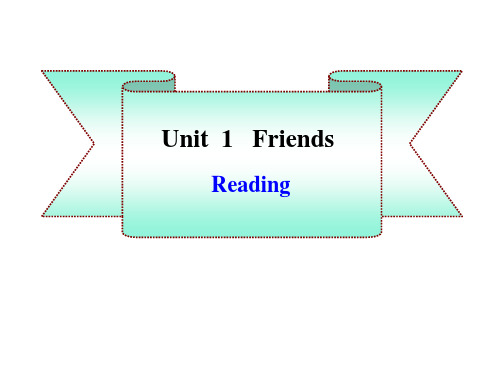
Appearance( 外貌):
I want to tell you about my best friend Betty. She is as slim as I am. She has short hair. She is one of my best friends.
slim, short hair
I have a wonderful friend named Max. He is very
tall ----- almost 1.75metres He is the tallest boy in my class. However, he has poor eyesight because of working on computer too much at night. He wears small,round glasses and they
a true
tell her anything because she can keep a
friend, keep a
secret.
secret, kind
She is kind and never says a bad word about anyone.
T or F questions:
1. Betty is ready to help old people only. 2.Betty wants to be a dancer and travels around the
Yang Liwei is wonderful.
He is good at telling funny jokes.
Zhao Benshan has a sense of humour.
He wears round glasses and they make him look smart.
牛津译林版八年级英语上册Unit1 精品课件(共35张PPT)
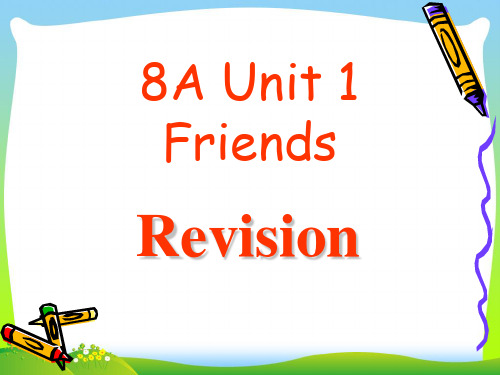
13、He who seize the right moment, is the right man.谁把握机遇,谁就心想事成。2021/7/302021/7/302021/7/302021/7/307/30/2021
• 14、谁要是自己还没有发展培养和教育好,他就不能发展培养和教育别人。2021年7月30日星期五2021/7/302021/7/302021/7/30
Betty helpful
generous
Friends
My best friend
Best friends
•Future plan: to be a (s5)in_g__er
Max
•Looks: the (6)t_a_l_leisnthis class •Wears small round (7g) l_a_s_s__es
(adj)
思维导图
••k(2e)e_sp_h_aa_r(e1o)n_es_’se_c_ood friend •make sb. happy
short
•Looks: slim and has (3)____
•Personality:(4)_____ and
He is not as generous as his elder brother.
2.比较级:可用much, a lot ,a little ,a bit, still, even , far等修饰. 其主要句型有: ⑴比较级+than
Mary is much younger than Sue. ⑵the+比较级+of+两者
重点词组和短语
21、关心、在意 care about 22、讲笑话 tell jokes
外研版八年级英语上Module1 Unit1课件(共46张PPT)

现在全世界共有50多个国家和地区把 英文作为官方语言。
2021/6/20
9
English is very important and useful.
1. Do you like English? 2. How do you learn English? 3. Do you think it’s difficult to learn
Module 1 How to learn English
Unit 1 Let’s try to speak English as much
as possible.
2021/6/20
1
Learning goals:
1.Master the new words and phrases.
2.Talk about the importance of learning English.
n.字母
查;查找
n.错误,过错
犯错误
v. 理解;明白
n. 建议;意见
v.aux.应该
adj 可能的
写下,记下
n.笔记本
4
22.forget(forgot) 23.pronounce 24.aloud 25.radio 26.pronunciation 27.key 28.main 29.excellent 30.agree 31.agree 2021/6/20 with sb.
li_s_te_n_ing vocabulary letter源自grammar English
sp_e_a_k_ing pronunciation
wr_i_ting
punctuation
sentence r_e_a_ding
2021/6/20
八年级英语上册--M1 Unit 1课件
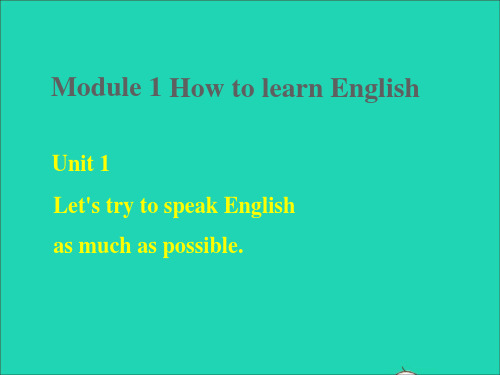
Module 1 How to learn English
Unit 1 Let's try to speak English as much as possible.
点 击 画 面 播 放
1
Listening and vocabulary
Read the instructions and check(√)the ones you
eg:You must correct the bad habits. 你必须改正这些坏习惯。
Can you correct my pronunciation? 你能纠正我的发音吗?
考向二 correct adj. 正确的(同义词right,反义词 wrong/incorrect) correctly adv. 正确地 eg: Choose the correct order according to the passage. 根据短文选择正确的顺序。
aloud every day
4
Underline the correct words and expressions. Here is my (1) advice/notebook on learning English.
Speak English (2) always/as much as possible in class, and listen to English (3) in the newspaper /on the radio. I (4)agree /forget it is a good idea to look up new words in the (5) notebook /dictionary. You can find the (6) correct / excellent pronunciation and learn the meaning.
Unit 1 Let's try to speak English as much as possible.
点 击 画 面 播 放
1
Listening and vocabulary
Read the instructions and check(√)the ones you
eg:You must correct the bad habits. 你必须改正这些坏习惯。
Can you correct my pronunciation? 你能纠正我的发音吗?
考向二 correct adj. 正确的(同义词right,反义词 wrong/incorrect) correctly adv. 正确地 eg: Choose the correct order according to the passage. 根据短文选择正确的顺序。
aloud every day
4
Underline the correct words and expressions. Here is my (1) advice/notebook on learning English.
Speak English (2) always/as much as possible in class, and listen to English (3) in the newspaper /on the radio. I (4)agree /forget it is a good idea to look up new words in the (5) notebook /dictionary. You can find the (6) correct / excellent pronunciation and learn the meaning.
人教版英语八年级上册Unit 1 总复习课件PPT(共18页)
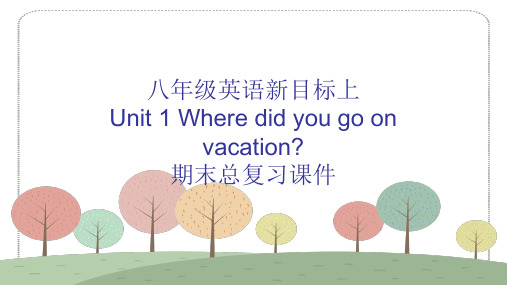
Is everybody here? 大家都到齐了吗? 4)something,somebody,someone,somewhere用于肯定句及表 示请求或建议的疑问句中,而anything,anybody,anyone, anywhere用于否定句、疑问句及条件状语从句中。如: Did you do anything interesting? 你做了有趣的事吗?(表疑 问) Why don’t you visit someone with me? 你为什么不跟我一起 去拜访下某个人呢?(表建议)
Did you buy anything special?你买了什么特别的东西吗? Yes, I bought something for my father.对,我给父亲买了一 些东西。
How was the food? 食物怎么样? Everything tasted really good.每一样东西真的都好吃。
人教版英语八年级上册Unit 1 总复习课件(共18张PPT)
人教版英语八年级上册Unit 1 总复习课件(共18张PPT)
三、习惯用法、搭配 11. stop doing sth. 停止做某事 12. look + adj 看起来 13. dislike doing sth. 不喜欢做某事 14. Why not do sth. 为什么不做…….呢? 15. so + adj + that + 从句 如此……以至于…… 16. tell sb. (not) to do sth. 告诉某人(不要) 做某事 17. keep doing sth. 继续做某事/一直做某事 18. forget to do sth. 忘记去做某事 / forget doing sth 忘记做 过某事
Did you buy anything special?你买了什么特别的东西吗? Yes, I bought something for my father.对,我给父亲买了一 些东西。
How was the food? 食物怎么样? Everything tasted really good.每一样东西真的都好吃。
人教版英语八年级上册Unit 1 总复习课件(共18张PPT)
人教版英语八年级上册Unit 1 总复习课件(共18张PPT)
三、习惯用法、搭配 11. stop doing sth. 停止做某事 12. look + adj 看起来 13. dislike doing sth. 不喜欢做某事 14. Why not do sth. 为什么不做…….呢? 15. so + adj + that + 从句 如此……以至于…… 16. tell sb. (not) to do sth. 告诉某人(不要) 做某事 17. keep doing sth. 继续做某事/一直做某事 18. forget to do sth. 忘记去做某事 / forget doing sth 忘记做 过某事
八年级英语上册unit1wheredidyougoonvacationPPT优秀课件人教
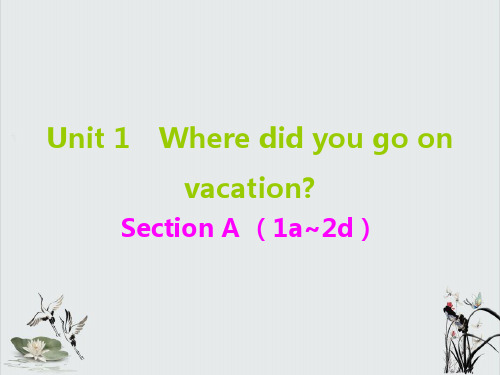
要点梳理
( A )2. —Sir, _____ called you just now. I told
him to phone again 20 minutes later.
—OK. Thanks, Nancy.
A. someone
B. nobody
C. anyone
D. everyone
3 take的用法
课前导学
8. _m__y_s_e_lf_ pron. 我自己;我本人 9. ___y_o_u_r_s_e_lf__ pron. 你自己;您自己 10. ____s_e_e_m_____ v. 好像;似乎;看来 11. ___b_o_r_e_d____ adj. 厌倦的;烦闷的 12. __s_o_m__e_o_n_e__ pron. 某人 常考短语 1. _g_o__o_n__v_a_c_a_ti_o_n__ 去度假 2. ____s_ta_y__a_t _h_o_m__e____ 待在家里
课前导学
3. _g_o__to__s_u_m_m__e_r_c_a_m__p_ 去夏令营 4. __t_a_k_e_p_h__o_to_s____ 拍照片 5. ___q_u__it_e_a__fe_w_____ 相当多;不少 6. __m_o_s_t_o__f _th_e__ti_m__e_ 大多数时间 典型句子 1. Where did you go on vacation? _你__去__哪__里_度__假__了__?_____________________________ 2. Oh, did you go anywhere interesting? _哦__,_你__去__了__什__么_有__趣__的__地__方_吗__?___________________
- 1、下载文档前请自行甄别文档内容的完整性,平台不提供额外的编辑、内容补充、找答案等附加服务。
- 2、"仅部分预览"的文档,不可在线预览部分如存在完整性等问题,可反馈申请退款(可完整预览的文档不适用该条件!)。
- 3、如文档侵犯您的权益,请联系客服反馈,我们会尽快为您处理(人工客服工作时间:9:00-18:30)。
straight
short, shoulder-length big, small
square, round
Build: She is _s_m_a_l_l _. Eyes: She has _s_m_a_l_l _ eyes. Face: She has a _lo_n_g_ face. Hair: She has __s_h_or_t__ hair. Ears: She has _b_i_g___ ears.
What do you think of him?
Build: He is _st_r_o_n_g_. Height:He is __t_al_l__. Eyes: He has _b_i_g___ eyes. Face: He has a _lo_n_g___ face. Hair: He has _s_h_o_r_t __ hair. Mouth: He has a _b_i_g___ mouth.
——by Fu Yijie Beijiao Junior Middle School
She is short. (10’) She is very small. (8’) She has straight shoulder-length hair. (6’)
She is pretty. (4’) She is a new friend of yours. (2’) You learnt about her only two days ago! (0’)
handsome, smart, good-looking
What do you think of her?
Build: She is _s_m_a_l_l _. Eyes: She has _s_m_a_l_l _ eyes. Face: She has a _lo_n_g_ face. Hair: She has __lo_n_g___ hair. Teeth: She has _w_h_i_te__ teeth.
good-looking handsome lovely smart
We’ve learnt a lot of words to describe girls and boys, face and hair, etc. Please write down as many words as possible in the given time according to my instructions.
Build: He is __t_h_in__. Height:He is __t_al_l__. Eyes: He has _s_m_a_l_l _ eyes. Face: He has a _s_q_u_a_re_ face. Hair: He has _l_on_g____ hair. Nose: He has a s_t_r_ai_g_h_t nose.
Me
build
strong
thin
face
round
square
eyes
big
small
Appearance Build (身材) Height (身高) Legs
Style Hair
Length
Eyes Face
Adjectives small, slim, strong, thin
tall, short long
She is neither very tall nor very short. (10’) She is neither very fat nor very thin. (8’) She has long hair. (6’) She is an old friend of yours. (4’) She speaks English to you every day. (2’) She is talking to you now! (0’)
T: I’m thinking about a boy in this class. S1: Is he tall? T: Yes. S2: Is he strong? T: No. S3: Is he our monitor? T: No. S4: Does he have big eyes? T: Yes. ……
Try to use the adjectives you have learnt today to describe your appearance. Come on! Give us a vivid picture of yourself! You are the HERO!
Guess who I am thinking about by asking me questions about his/ her appearance. You can’t ask special questions and I can only answer “Yes” or “No”. If you are smart enough, you may not need to ask 20 questions! Then you can play this game with your classmates!
May
tall,long legs, small, slim,
short hair, straight, shoulder-length hair
Appearance
Build (身材)
Height (身高)
LegsΒιβλιοθήκη HairStyle Length
Adjectives small slim
tall long straight short shoulder-length
beautiful, pretty, lovely, good-looking
beautiful good-looking handsome lovely pretty smart slim
Girls beautiful good-looking
lovely
pretty smart slim
Boys
short, shoulder-length big, small
square, round
Build: She is _s_m_a_l_l _. Eyes: She has _s_m_a_l_l _ eyes. Face: She has a _lo_n_g_ face. Hair: She has __s_h_or_t__ hair. Ears: She has _b_i_g___ ears.
What do you think of him?
Build: He is _st_r_o_n_g_. Height:He is __t_al_l__. Eyes: He has _b_i_g___ eyes. Face: He has a _lo_n_g___ face. Hair: He has _s_h_o_r_t __ hair. Mouth: He has a _b_i_g___ mouth.
——by Fu Yijie Beijiao Junior Middle School
She is short. (10’) She is very small. (8’) She has straight shoulder-length hair. (6’)
She is pretty. (4’) She is a new friend of yours. (2’) You learnt about her only two days ago! (0’)
handsome, smart, good-looking
What do you think of her?
Build: She is _s_m_a_l_l _. Eyes: She has _s_m_a_l_l _ eyes. Face: She has a _lo_n_g_ face. Hair: She has __lo_n_g___ hair. Teeth: She has _w_h_i_te__ teeth.
good-looking handsome lovely smart
We’ve learnt a lot of words to describe girls and boys, face and hair, etc. Please write down as many words as possible in the given time according to my instructions.
Build: He is __t_h_in__. Height:He is __t_al_l__. Eyes: He has _s_m_a_l_l _ eyes. Face: He has a _s_q_u_a_re_ face. Hair: He has _l_on_g____ hair. Nose: He has a s_t_r_ai_g_h_t nose.
Me
build
strong
thin
face
round
square
eyes
big
small
Appearance Build (身材) Height (身高) Legs
Style Hair
Length
Eyes Face
Adjectives small, slim, strong, thin
tall, short long
She is neither very tall nor very short. (10’) She is neither very fat nor very thin. (8’) She has long hair. (6’) She is an old friend of yours. (4’) She speaks English to you every day. (2’) She is talking to you now! (0’)
T: I’m thinking about a boy in this class. S1: Is he tall? T: Yes. S2: Is he strong? T: No. S3: Is he our monitor? T: No. S4: Does he have big eyes? T: Yes. ……
Try to use the adjectives you have learnt today to describe your appearance. Come on! Give us a vivid picture of yourself! You are the HERO!
Guess who I am thinking about by asking me questions about his/ her appearance. You can’t ask special questions and I can only answer “Yes” or “No”. If you are smart enough, you may not need to ask 20 questions! Then you can play this game with your classmates!
May
tall,long legs, small, slim,
short hair, straight, shoulder-length hair
Appearance
Build (身材)
Height (身高)
LegsΒιβλιοθήκη HairStyle Length
Adjectives small slim
tall long straight short shoulder-length
beautiful, pretty, lovely, good-looking
beautiful good-looking handsome lovely pretty smart slim
Girls beautiful good-looking
lovely
pretty smart slim
Boys
